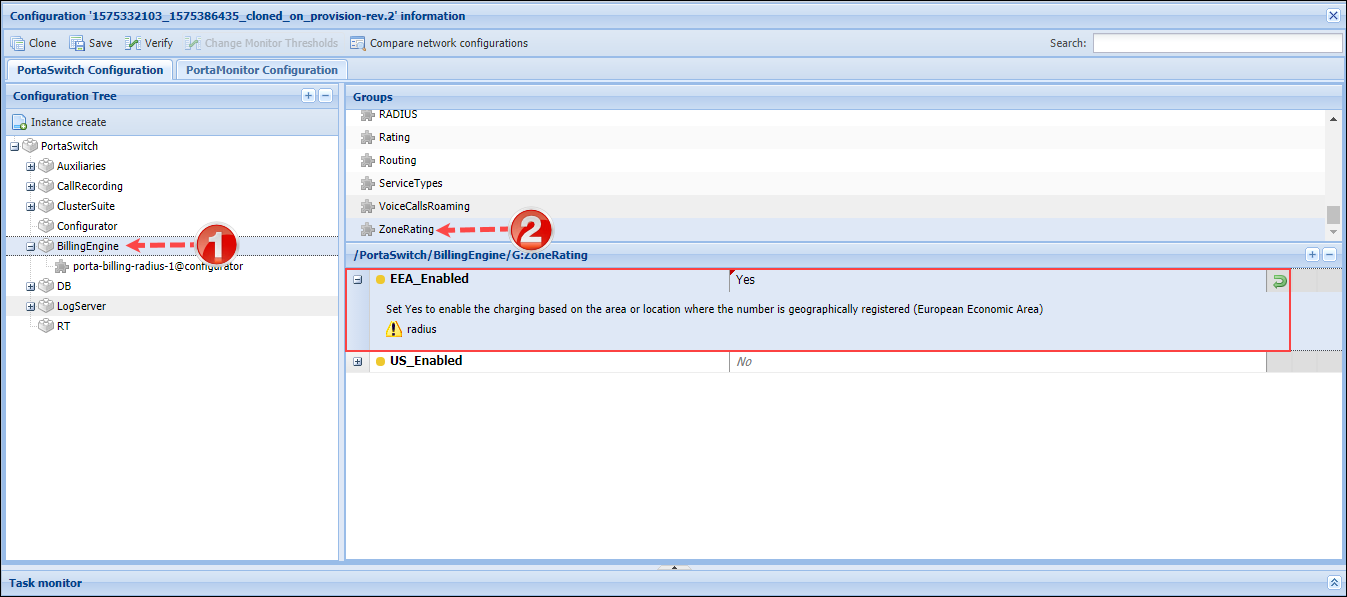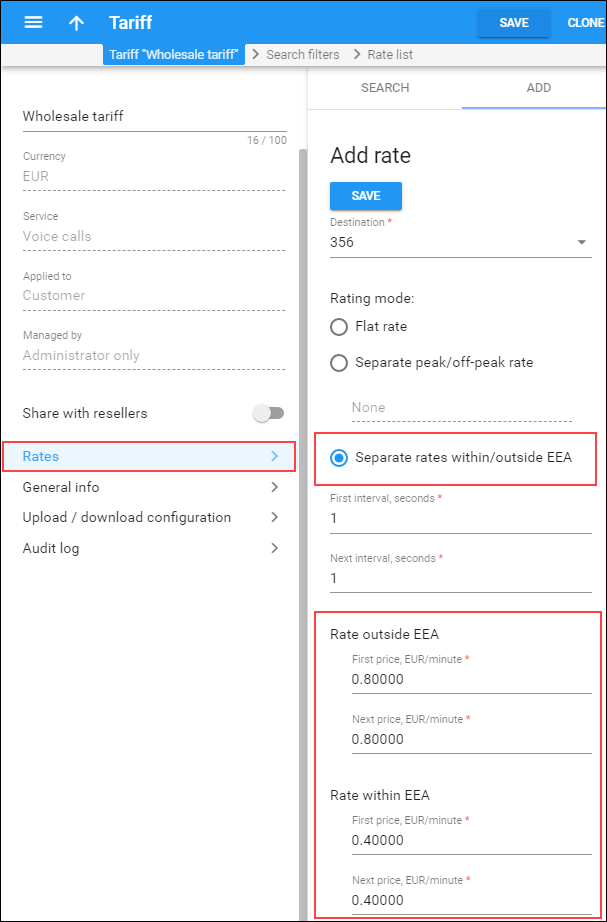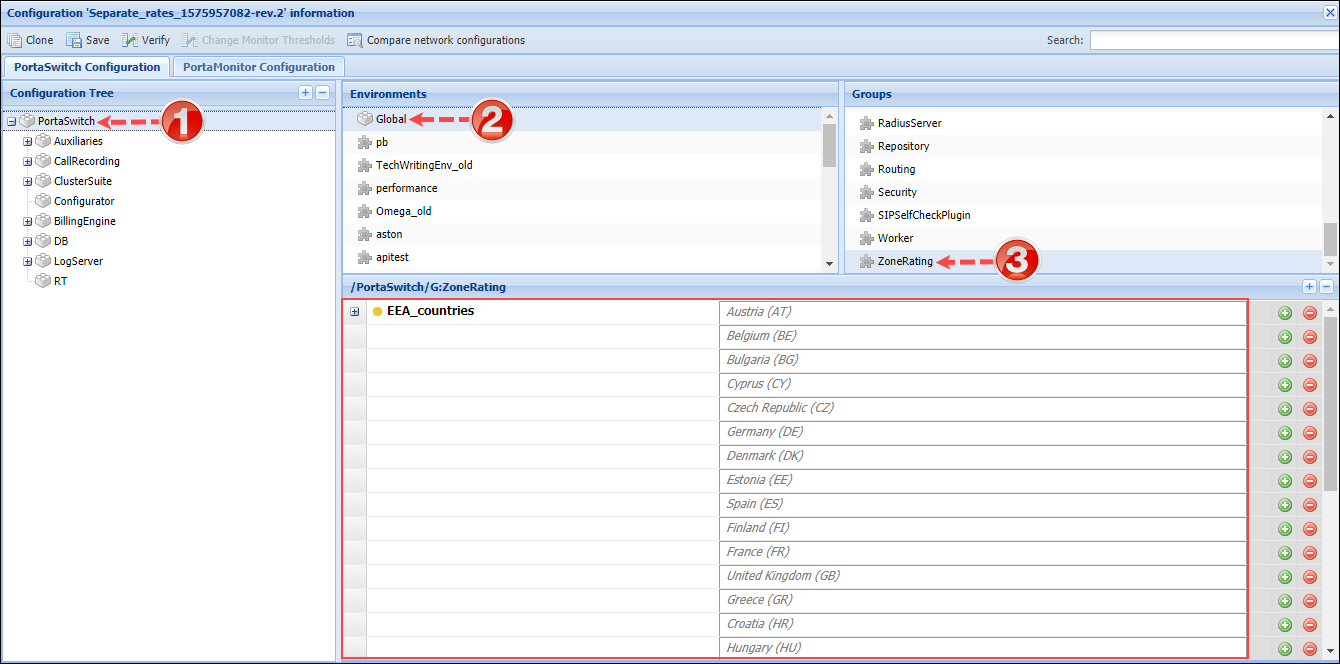Some European carriers apply separate charges for calls from within/outside the European Economic Area (EEA). Call costs are determined both by call origin (the country the call is made from) and destination (the country where it terminates.)
You can charge wholesale customers differently for calls from within/outside the EEA, too. You define separate rates for the same destination for calls made from both inside and outside the EEA. Then for each call to a European destination, PortaBilling checks whether the CLI belongs to the EEA countries and applies the corresponding rate.
![]() Upon activation of separate rates for calls from within/outside the EEA on the Configuration server (EEA_Enabled option is set to Yes), it is required to re-upload all tariffs containing EEA destinations. Otherwise, the calls within the EEA would be charged at 0 price.
Upon activation of separate rates for calls from within/outside the EEA on the Configuration server (EEA_Enabled option is set to Yes), it is required to re-upload all tariffs containing EEA destinations. Otherwise, the calls within the EEA would be charged at 0 price.
The list of EEA countries is predefined in PortaBilling. An administrator can adjust the default list of EEA countries in the ZoneRating.EEA_countries option on the Configuration server.
This is how it works:
Let’s say your wholesale customer, EasyCall, sends calls from all over the world to Malta. You route these calls to your vendor GlobalNet for termination.
GlobalNet charges you separately for calls to Malta made from within/outside the EEA as follows:
| Destination | Rate within EEA EUR/min | Rate outside EEA EUR/min |
|---|---|---|
| 356 | 0.1 | 0.5 |
You charge EasyCall as follows:
| Destination | Rate within EEA EUR/min | Rate outside EEA EUR/min |
|---|---|---|
| 356 | 0.3 | 0.8 |
Let’s consider these examples:
- GlobalNet terminates a call from Italy to Malta. Since Italy belongs to the EEA countries, the rate within the EEA is applied to this call. Thus, GlobalNet charges you 0.1 EUR per minute while you charge EasyCall 0.3 EUR per minute for this call.
- GlobalNet terminates a call from the USA to Malta.The USA destination does not belong to the EEA list so GlobalNet applies the rate for outside the EEA for this call – 0.5 EUR per minute, and you charge EasyCall 0.8 EUR per minute.
Private calls processing
By default, the CLI is provided in the ‘From’ SIP header. If an end user requests that their phone number be hidden from the party called (the Hide CLI feature is enabled), the ‘From’ header will contain “Anonymous” instead of the CLI. The actual CLI is stored in the PAI (P-Asserted Identity) SIP header and that’s the header PortaBilling uses to match the rate.
Your vendors can also deliver private incoming calls wherein the CLI is stored in the PAI SIP header. For PortaBilling to match the rates given by the PAI, these conditions must be met:
- The call must arrive from a trusted network (the Caller identity service feature is set to Supply for the incoming vendor connection).
- The account is configured to accept caller’s information: the CLI trust and Supply caller identity options are enabled.
Calls with overridden identity
A user can request that their identity be overridden for outgoing calls. For example, a company can insist that their employees use the company’s main phone number 340755511340 for all calls. When such a call arrives to PortaSIP, it includes the PAI header with the actual CLI (e.g.12065552211). PortaBilling uses the PAI header value to match the rate.
Configuration:
To enable separate rates for calls from within/outside the EEA follow these steps:
- Set the EEA_Enabled option to Yes for the ZoneRating group on the Configuration server.

- Add rates for calls within/outside the EEA to your customer tariff. We recommend uploading these rates from either a .csv or .xls file for wholesale customers. Please refer to the Rate Import handbook for complete details.

Note that setting peak/off-peak prices is not supported for the Separate rates within/outside EEA rating mode.



